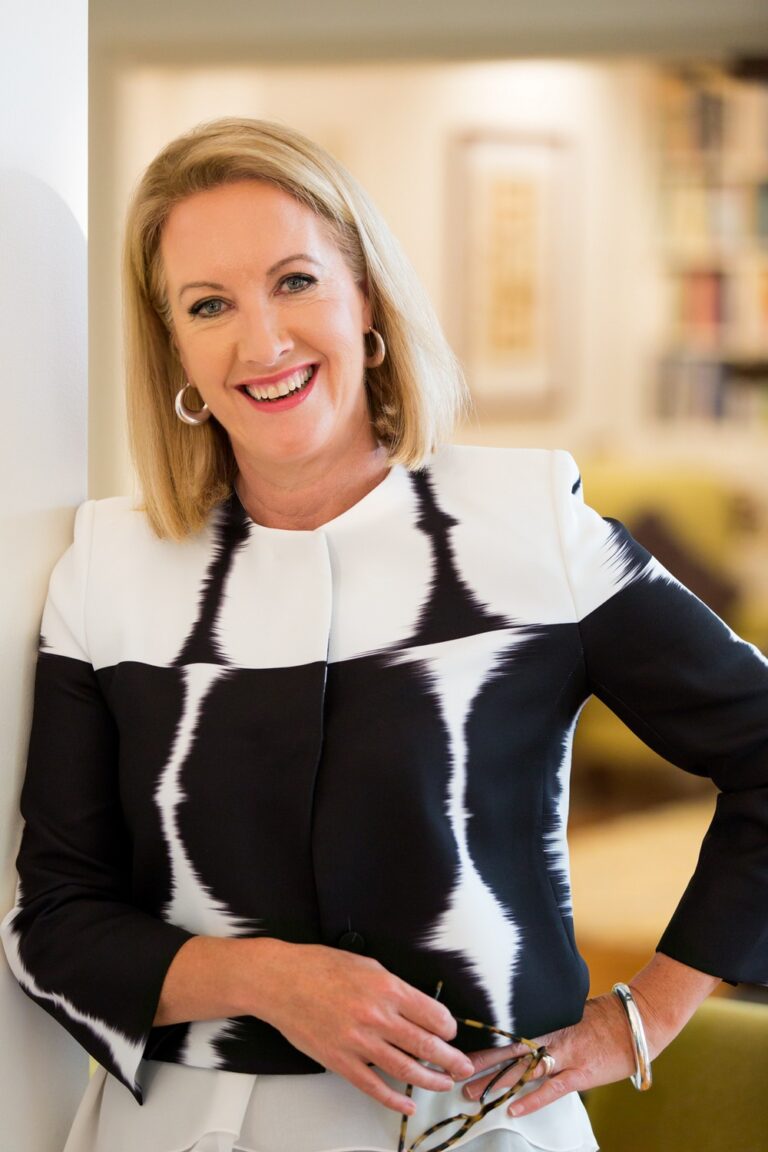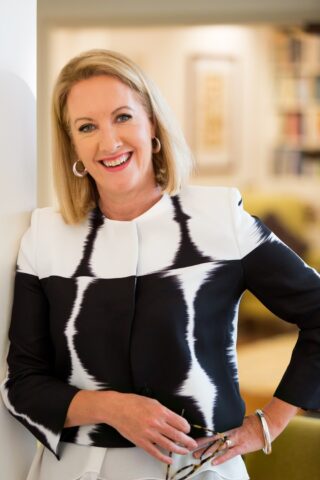- Entry type: Person
- Entry ID: AWE5707
Broderick, Elizabeth
- AO

- Occupation Commissioner, Lawyer
Summary
Elizabeth Broderick AO was Australia’s longest-serving Sex Discrimination Commissioner, from 2007 to 2015. She was also Commissioner responsible for Age Discrimination from 2007 to 2011.
A former head of legal technology at law firm Blake Dawson Waldron (now Ashurst), where she practised for nearly two decades, she became the firm’s first part-time partner and later served as a member of its board. In 2001 she was named Telstra NSW Business Woman of the Year; she also received the Centenary Medal.
As Commissioner, Broderick instigated the, ‘Male Champions of Change’ strategy, to help advance gender equality in Australia. It has since been replicated across the country and achieved international prominence, thanks in part to Broderick’s subsequent appointment as Global Co-Chair of the Women’s Empowerment Principles Leadership Group, a joint initiative of the UN Global Compact and UN Women.
On behalf of the Commission, Broderick also conducted the first independent Review into the Treatment of Women in the Australian Defence Force. Broderick was named overall winner of the Australian Financial Review and Westpac 2014 ‘100 Women of Influence Awards’ in acknowledgement of her achievements while in office.
Broderick is Principal of Elizabeth Broderick & Co., Senior Advisor to the Australian Federal Police Commissioner on cultural change and Special Advisor to the Under-Secretary-General of the United Nations and the Executive Director of UN Women on Private Sector Engagement. She serves on a number of boards and continues to advocate for societal change. In 2016 Broderick was appointed an Officer of the Order of Australia. She was also named 2016 New South Wales Australian of the Year. She has honorary degrees from the University of New South Wales and The University of Sydney, and the University of Technology Sydney.
Elizabeth Broderick was interviewed by Kim Rubenstein for the Trailblazing Women and the Law Oral History Project. For details of the interview see the National Library of Australia CATALOGUE RECORD.
Details
Elizabeth Broderick was born in 1961 in Hobart, Tasmania; she has a twin sister and a younger sister. When she was a child, the family moved to New South Wales. From a young age, she observed her parents, Margot and Frank Broderick, sharing the housework and supporting each other’s careers. Learning from this display of equality, she also absorbed from her parents the value of community responsibility [Executive Style]. Broderick had her first taste of public leadership when she became head girl of Meriden Anglican School. She went on to graduate from the University of New South Wales with Bachelor of Arts (Computer Science) and Bachelor of Laws degrees.
Far-sighted, Broderick recognised early on the significance which technology would have to the provision of client services; between 1985 and 1987, she worked overseas, exploring how technology could be used to manage evidence in litigation cases and complaints systems. [Gome and Ross]. After joining the research department of the Sydney office of Blake Dawson Waldron (now Ashurst) in 1987, Broderick began employing technology to help lawyers retrieve documents more efficiently [Gome and Ross].
In 1991, Broderick established the firm’s legal technology group, providing services in-house and externally to clients. In 1995 she broke new ground, revolutionising the firm’s culture, when she became the first part-time partner, and head of legal technology and the first member of the Board to work part-time. [Executive Style].
An innovator, Broderick thrived on her work and her output was correspondingly prodigious: among other things, she created commercial computerised legal products in such fields as environmental law, occupational health and safety, and workplace discrimination; she also set up an online service – Virtual Lawyers – for legal enquiries. Her achievements led to her being named “2001 Telstra NSW Business Woman of the Year” [Gome and Ross]. She also received the Centenary Medal, for service to Australian society through business leadership.
Between 2003 and 2006 Broderick was a board member of Blake Dawson Waldron. When she departed the firm in 2007, 10 per cent of the partners were part-time and 20 per cent of employees had adopted flexible work arrangements [Gome and Ross].
Appointed Sex Discrimination Commissioner in 2007, Broderick backed the prevention of domestic violence against women and sexual harassment; she also championed lifetime economic security for women. Another preoccupation was the balancing of paid work and unpaid caring responsibilities, while yet another was the promotion of women to positions of leadership. She also sought to strengthen laws relating to gender equality and agencies.
Broderick was a strong proponent for Australia’s national paid parental leave scheme [Human Rights]. Seeing the provision of opportunities for both men and women as critical to achieving a fair society, Broderick has advocated for flexible working conditions for both sexes, arguing for “more senior part-time roles filled by men and women” [Nader].
In April 2010, Broderick initiated the ‘Male Champions of Change’ strategy; she remains its convenor. Broderick has said of it: “This initiative engages powerful and influential men from all sectors to stand beside women and lead tangible action to promote gender equality and social change” [Broderick LinkedIn]. The program began with Broderick asking 12 male ‘captains of industry’ if they would promote gender equality within their workplace. Its success has seen it replicated around the country and also introduced to audiences overseas. Although it has been criticised for relying on men to advance women’s interests, Broderick argues that: “what we need to do is recognise where power sits in this country, and that is clearly in the hands of men. So if we want to move to a model where power is shared, we need to work with those who hold it” [Marie-Claire].
Broderick’s work with the Commission took her around the country and across the world, including representing Australia each year at the United Nations Commission on the Status of Women. In 2009 she was part of an Australian delegation which included Aboriginal representatives of the Marninwarntikura Fitzroy Women’s Resource Centre who attended the 53rd Session of the UN Commission on the Status of Women [Human Rights Leadership]. Charged by the Australian Government with leading the first independent Review into the Treatment of Women in the Australian Defence Force (ADF) following allegations of sexual misconduct in the ADF’s Academy in 2011, Broderick tabled her fourth and final report on women within the ADF in 2014. [Sydney Morning Herald Defence].
Broderick was twice reappointed as Federal Sex Discrimination Commissioner in 2012 for 2 years and for a further year in 2014. In embarking on her new term, she sized up the state of gender equality in Australia thus: “… the pay gap is the largest it’s ever been at 18.2 per cent. Violence against women is still a significant issue: 1.2 million women today will be either currently living or have recently done so in a relationship characterised by violence. And we still have very few women at leadership level across Australia” [Kerin].
In October of the same year, Broderick was named overall winner of the Australian Financial Review and Westpac 2014 ‘100 Women of Influence Awards’. A unanimous choice as winner, the judges were impressed by Broderick’s communication skills which allowed her to engage with and influence a broad cross-section of people for the betterment of society, and what they considered her transformation of the role of Sex Discrimination Commissioner [Sydney Morning Herald Discrimination]. The following month, she was conferred with an honorary degree from the University of Sydney [University]. She also has honorary degrees from the University of New South Wales and Sydney University of Technology.
When her term as Sex Discrimination Commissioner ended, in September 2015 Broderick founded Elizabeth Broderick & Co. She was later appointed 2016 New South Wales Australian of the Year.
In 2016, Broderick was appointed an Officer of the Order of Australia for her advocacy with respect to human rights and family violence [Guardian]. She was also appointed Special Advisor to the Under-Secretary-General of the United Nations and the Executive Director of UN Women on Private Sector Engagement. In this role she is helping the UN to improve engagement with the private sector with the aim of producing more gender-diverse organisations [Huffington Post].
Broderick is a member of the Australian Rugby Union Board, International Services of Human Rights Board, University of New South Wales Law Advisory Board, Australian Defence Force Gender Equality Advisory Board and the Victoria Police Corporate Advisory Group. She is also a Senior Adviser to McKinsey and Company. She was formerly a member of the World Bank Advisory Council on Gender and Development and was Partner Co-Director with NATO on Women, Peace and Security.
Broderick has garnered widespread respect for her skills as a communicator and leader with demonstrated strengths in cultural and organisational change. She has been a social innovator and visionary who has championed important matters concerning gender equality which have led to improvements in Australian society.
Archival resources
Digital resources
Published resources
-
Newspaper Article
- Australia Day honours: David Walsh and Elizabeth Broderick among recipients, Davey, Melissa and Brereton, Adam, 2016, https://www.theguardian.com/australia-news/2016/jan/26/australia-day-honours-david-walsh-and-elizabeth-broderick-among-recipients
-
Resource Section
- Law, Kerwin, Hollie and Rubenstein, Kim, 2014, http://www.womenaustralia.info/leaders/biogs/WLE0624b.htm
-
Site Exhibition
- Australian Women Lawyers as Active Citizens, http://www.womenaustralia.info/lawyers/biogs/AWE5707b.htm
